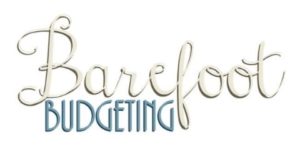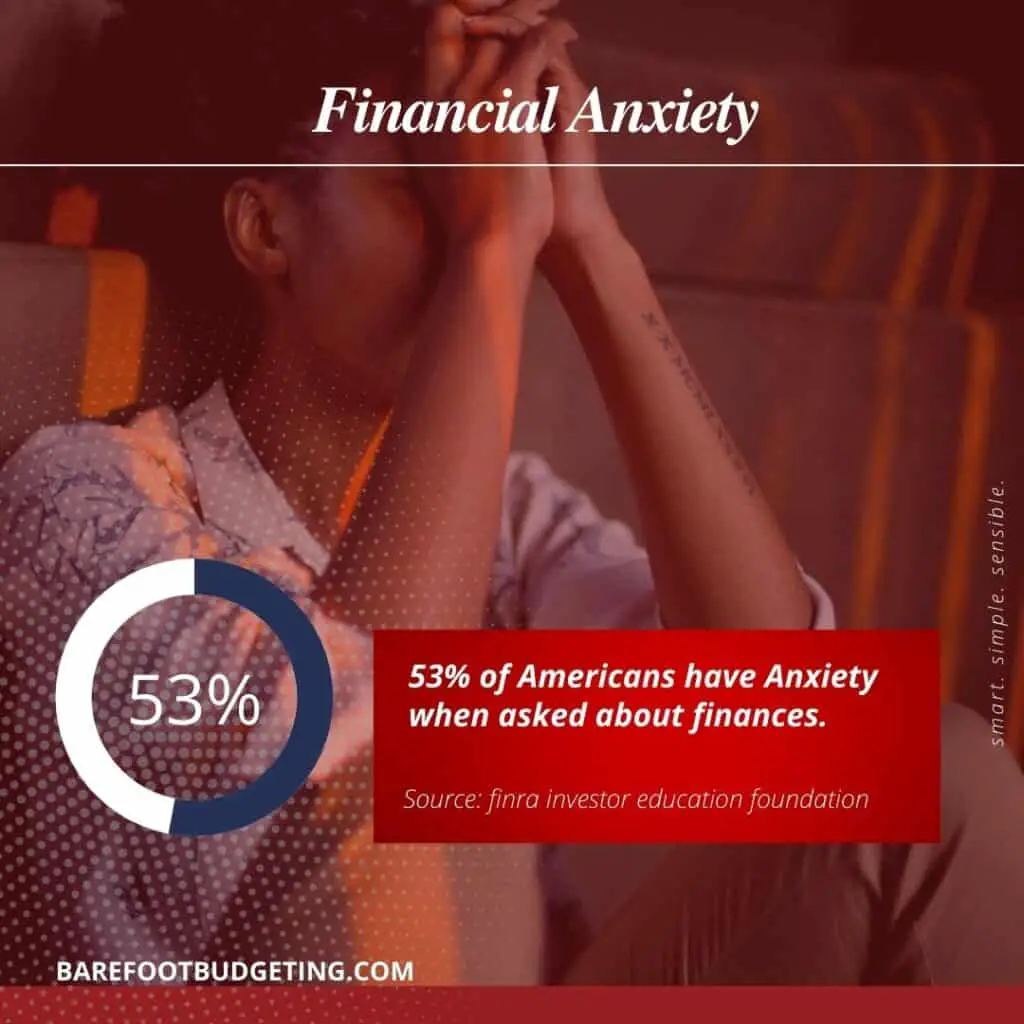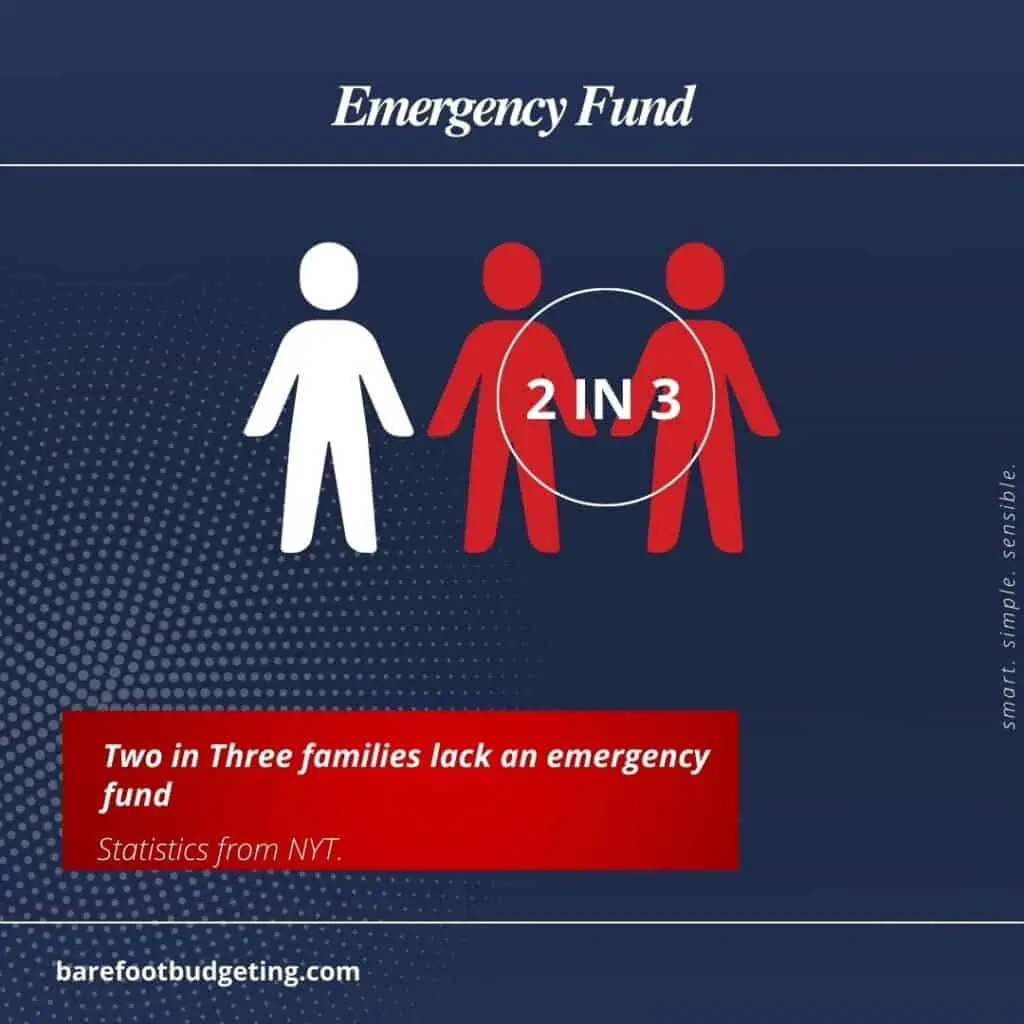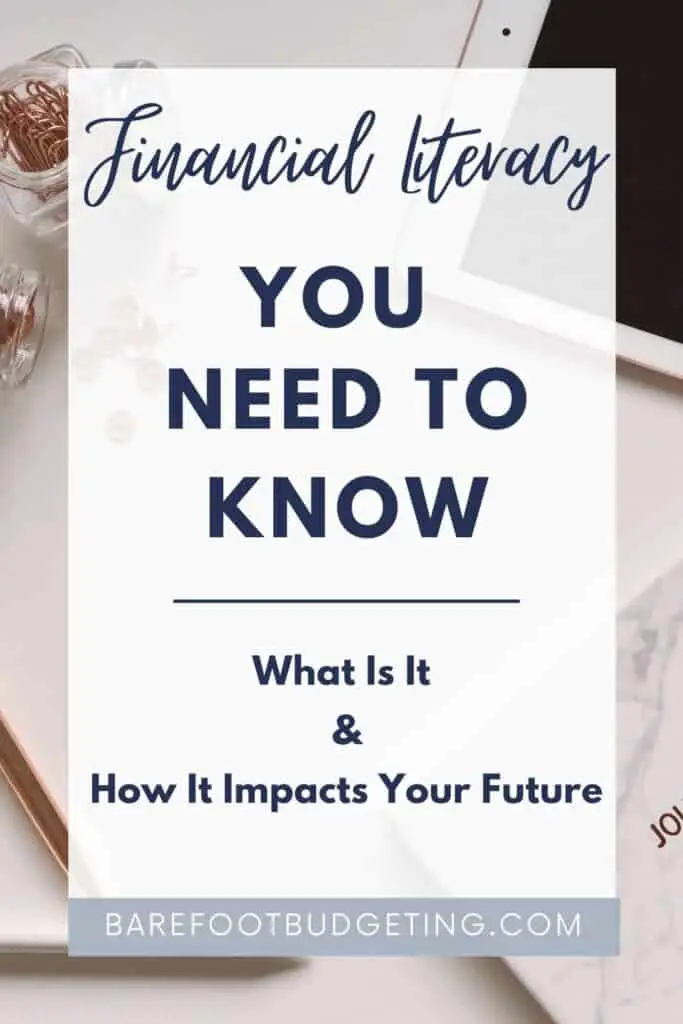*This post may contain affiliate links. As an Amazon Associate we earn from qualifying purchases.
Financial literacy empowers people to make informed financial decisions. Finance is a word that most of us try to avoid when we are acquiring knowledge about what makes the world go round. It’s what holds it together, and what makes our society tick. In fact, many times finance is not even included in a student’s core curriculum.
What we cover in this article today will be a beginning on your journey to finding your pace in learning. Creating your path to opening up your mind to financial literacy. Here’s where we’ll take you:
- Definition of Financial Literacy, what the heck does it mean anyway?
- What the heck is financial literacy and really why even bother, that’s for rich kids (nope).
- It’s still just a big word that people throw out there to sound smart. Show me some real-life examples and make me a believer.
What Is The Meaning Of Financial Literacy?
Literate: Knowing a particular subject, most often you hear this when referring to someone reading. However, Literate is being educated through reading, listening, and understanding the subject. If responsibly researched, yes, self-taught is also a way to become literate.
Literacy: Being literate, being knowledgable, and able to comprehend (understand and apply) the subject you’re literate to appropriate situations.
Financial Literacy: Understanding the basic facts about money, being able to apply that information in your daily decisions and choices when needed.
This being said, what exactly is financial literacy?
Financial literacy refers to the ability to demonstrate an understanding of money management, debt reduction, and investment skills. It is when people have sufficient information about the factors involved in planning for and taking care of themselves and any dependents. This empowers every individual with the necessary skills to make informed choices. This is important at key points in life. Such as saving money for school fees, building a home, and retirement plans.
What Is The Purpose Of Financial Literacy
The more you understand the basics of managing your money, the more options you’ll have in life.
- Be able to make informed choices and decisions about your own financing.
- Do this without fear of being taken advantage of.
- Reduce the risks involved when considering investing.
This is not just reading from a book what others think about what is needed to live the good life. It has more to do with what helps people become better investors. This also is what makes them self-sufficient when it comes to managing their personal finance affairs appropriately.
What Financial Literacy Means To You; Why Is It Important?
Financial literacy also helps understand what kind of an impact different levels of investment returns can make. This would be on their bank balance, retirement fund, and other forms of savings and investments throughout life. Also, information about what levels of debt management are appropriate. This helps with what can be done to keep a family’s finances in check. Also, know what individual needs are. These all parts of being able to make sound financial decisions.
What we earn plays a role in this as well. What assets and liabilities we have will significantly affect what kind of life the family will live during one’s golden years.
Financial literacy also teaches individuals about money-saving tips.
Why Is It Important To Be Financially Literate?
The ability to make informed, educated choices about your financial well-being is one of the most basic reasons for understanding money.
Financial literacy is what helps us learn what it takes for what we need to survive.
This knowledge is what helps individuals spend wisely and help them make sound and reliable financial decisions. To achieve this, we need to understand what kind of effect levels of investment returns contribute toward their net worth. Calculate this throughout life expectancy as he or she learns about what retirement really means. Financial literacy guides consumers on how they can manage debt, save more and invest wisely. The ultimate reward — retire with peace of mind and leave behind wealth that will last longer.
What Is An Example Of Financial Literacy?
Glenda earns $2000 every month. She spends about $1000 on her monthly bills. The other $1000 is what she has left each month. She pays $50 for a monthly gym membership but does not use many of their services. And she uses some of the money to buy expensive things like brand-name clothes, gifts for others, and going out with friends. At the end of the month, she has no money saved up for unplanned expenses or emergencies that might happen.
A short-sighted view is when you are not looking ahead. Your money management might seem perfect, but in the long run, it is not good enough. This means that you always spending all you have and living paycheck to paycheck with no savings plan in place.
Glenda might be able to wear the clothes she wants, buy exciting gifts, and socialize with her friends whenever she wants but it comes with a bigger price. She has no fall-back plan or savings. If an emergency happens she may need to borrow or use a high-interest rate credit card. This will increase her debt. She needs to get a budget in place and follow through with better spending choices.
To be fairly literate, you must understand financial thoughts. Terms like the worth of money, interest, and debt management. By understanding these, you should be able to make knowledgeable choices about investments, real estate, loans, retirement, and insurance.
What Are The Benefits Of Financial Literacy?
The benefits of financial literacy are what help individuals to get what they want and to plan for the future. Knowledge is what helps people have better results over time. Here are some of the benefits of knowing more about finances
- You can save money from your paycheck to buy something you want later.
- You know when it’s what to buy what you want by what exactly your money is worth.
- Knowing what kind of effect investment returns make on what kind of retirement plan you will have when it comes retirement time.
- Ability to determine if a savings goal like a down payment for a new house or a car purchase is within reach.
- Understanding what kind of effect a credit score has on what you need to get what you want when it comes time to finance something like a car, house, or anything else.
- Effectively do what is necessary to decrease debt and save more wisely for what are future goals like retirement.
- Guide you in understanding what kind of need you may have in a crisis and your options
What Does Financial Literacy Teach You?
Financial literacy is the ability to understand and effectively use various financial skills, including personal financial management, budgeting, and investing.
source: Investopedia
1. Financial literacy makes us aware that what we buy affects not only our families but also our goals and savings.
2. Reduces risks
3. Helps us make better decisions on what kind of investment returns would affect our net worth.
4. Financial literacy is also a valuable tool for not only those who need basic information about credit reports and loans. It also gives you a greater understanding of investment aspects such as stocks, funds, and real estate appraisals.
5. These benefits can help families build a secure future. This will have a positive impact regardless of what the overall economy or the markets are doing today
The primary benefits of being financially literate are that it enables us to make intelligent fiscal decisions. It gives us the know-how and tools we need to manage funds efficiently. These are things like budgeting, saving, obtain funding, and investment choices. The most important is having our own knowledge to reach our financial goals with confidence.
The individual benefits of this knowledge will vary depending on each person’s situation. Some common occurrences where financial literacy helps include:
- Creating a balanced budget
- Improvement and consistency within your budget
- Saving for future goals, emergency fund, and retirement
- Reducing expenses
- Purchasing real estate (including investment property)
- Choosing appropriate insurances (life, health, home, etc.)
- Identifying investment opportunities wisely
- Buying a vehicle
- Saving for higher education
- Managing debt not debt managing you
- Choosing and appropriately using credit cards
Why Is Learning About Money Important For Students?
Financial literacy is something every student should know. As a child grows up what he/she will learn about money, what he/she will find out what kind of value it has will help build a foundation for responsible choices throughout their entire lives. this is something parents, teachers, and schools can and should do to help. Just a few early benefits would be:
- develop good spending habits, and identify what he or she would need and their goals
- what to do to save money, percentage of money to pay themselves (aka savings)
- buy something he or she wants later like a car
Financial literacy will help students learn “What Makes a Good Choice” and “What Good Money Choices Look Like”
- Budgeting/money management basics
- Understanding good credit, credit reports including how to build a positive credit history
- Avoid future debt
- How to earn extra money
- What kind of investments they can have
These skills and more build stronger, better-equipped children into adults who are more able to handle finances. It empowers them with the confidence to make good choices about what impacts their future. These are foundations that every child should be entitled to.
What Are The Pillars Of Financial Literacy
The four pillars of Financial Literacy will give you the knowledge and resources you need to have a more secure financial life.
- Debt = Liabilities and Expenses
- Budgeting = A Plan for your money and income
- Savings = Emergency Fund, Goals (short term and long term)
- Investing = Putting your money in a safe place so that it works and earns for you over time
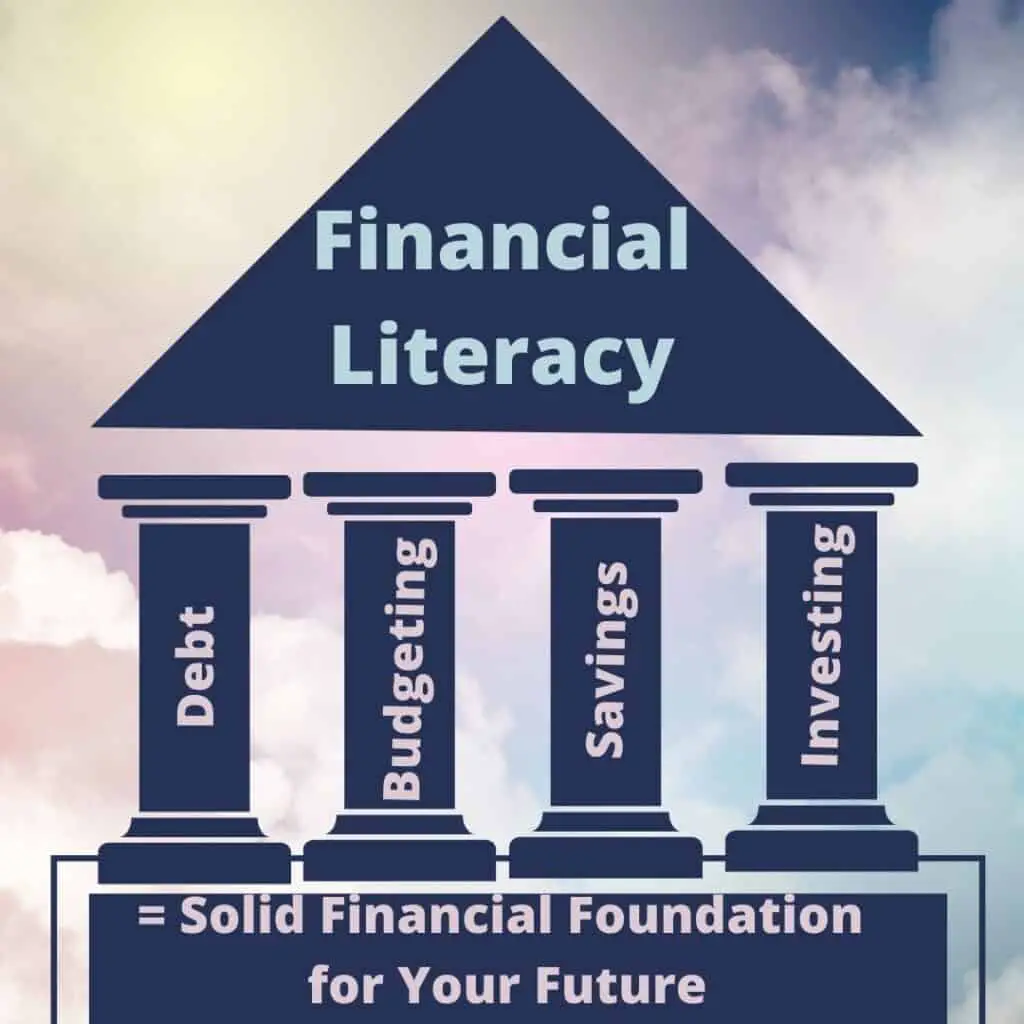
How Important Is Learning About Finances To Everyone?
Everyone can benefit from some type of financial literacy. No matter what you do for a living it can affect your life.
Financial literacy is important to everyone because no matter what kind of job people have it will affect their future. Even if someone has a great paying job they should still learn financial literacy. They’ll make better decisions about what they spend. Some people these days have a hard time saving, making it easy to get into debt.
It helps everyone consider future goals, retirement, and how to reach those goals. It will teach them what kind of things they should save for now to make better decisions later on. Also to be able to spot a ‘scam’ when they see one.
The more money you make the more debt you will probably have. Learning how to save for a certain goal will help you reach that goal. This is regardless of how much or little money is involved.
“ it enlightens us to invest and create income streams” from Conektome
How Does Learning All This Start?
- Start with your own budget and give it a good shake-down.
- Get to know your bank statements (or open a bank account)
- Listen to podcasts, watch youtube, read online articles from trusted sources.
- Talk with a person at the bank about differences in savings, checking accounts. Follow up with finding out how CD’s work, other investment opportunities they offer. Your bank is a local, free resource.
- Go to the library if that’s your thing. Just tell the librarian you’re looking to understand more about money management, financial literacy, etc. They’ll get you started. Take notes so you know which sources resonate most with you.
- Read, Listen, Watch and Ask questions.
Why We Need Financial Education
Financial literacy can show a person how to budget, how to save, how to earn extra income, and what kind of investments they should be making. It will help them understand how money works and where it comes from.
It also helps someone identify areas where they need to save what they can do to earn more money. This will help them learn what is a safe investment. Also, what kind of questions to ask when making an investment.
We learn how to use credit cards responsibly. People become more comfortable negotiating loan terms with creditors, make arrangements for loans or mortgages, and choose appropriate insurance coverage. Now we’ll know what to do when the unexpected occurs.
It can help anyone feel more confident with what they do with their money. Most people these days don’t know what to do when it comes to making good financial decisions. Some can even lose everything they worked for just because of poor decision-making skills and bad credit.
Learning about money management is essential to surviving in this world. Lack of know what to do when can lead to a lifetime of difficult situations. Imagine homelessness, sub-standard living conditions, food deprivation, poor health, etc. These are things that happen every day. Information about money, how it works, how to protect it can greatly reduce these events.
Financial Literacy Should be on the Top Of Your List To Get Nailed Down
Financial literacy is the key to a better future for us all. If you want to see change, make it happen! Start empowering yourself with knowledge about how money works and what your options are when it comes to managing finances. Do this so that you can be proactive rather than reactive in this area of your life. When we take responsibility for our own financial well-being, we have more power over our lives as a whole. This will create positive ripples out into the world.
Join me on this journey to learn more about building wealth. We will do this while taking care of ourselves and those around us through education and empowerment. I hope that together we can improve not just one person’s life but many people’s lives, too.
